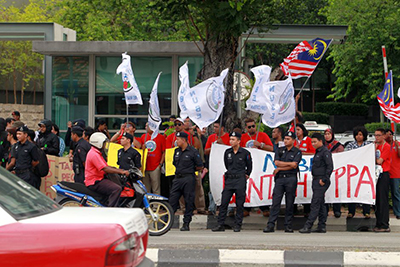
Source: www.thestar.com.my
In a couple of years, health decisions made by the Malaysian governments and health authorities can be subject to lawsuits by pharmaceutical companies, tobacco companies, and other companies that have a stake in health, or the lack of health.
So if the government perceives that a certain medication should be taken off the market because it has only been tested on a small amount of patients, and invalidates its patent, the company that produced that medication can sue the Malaysian government under Investor-State Dispute Settlement (ISDS) provisions under the Trans-Pacific Partnership Agreement (TPPA). Similarly, if health authorities want to make streets in a city, parks, and beaches smoke-free, then the tobacco company could sue under ISDS again. If the government requires that McDonalds reduces salt content in their fries by 5%, then the company could sue.
In the end, health authorities will live in fear of regulating and protecting health.
So what is ISDS? I am writing this blogpost in Istanbul from a strategy meeting on ISDS, together with stakeholders worldwide involved in labour, health, environment and consumer issues are discussing ISDS. It is a mechanism in trade agreements which allow corporations to sue governments at international tribunals (NOT DOMESTIC COURTS) if they feel their investments or profits are reduced by government laws. Damages are unlimited, and countries have paid up to hundreds of millions of US dollars per case, all from taxpayers money.
In Canada, the patent for Strattera, an ADHD drug, was invalidated because, among other reasons, it had been tested on only 22 patients. Eli Lilly, the producing company, thought this was infringing/reducing/expropriating their profits, and sued under ISDS provisions in the North American Free Trade Agreement. Eli Lilly has asked for USD$100 million in damages.
In Peru, an American smelting company called Renco had released pollutants into the environment around the town of La Oroya, resulting in 98% of the children there having lead-cadmium poisoning. The Peruvian government asked Renco to do a toxic waste clean up, and Renco sued under ISDS provisions, asking for damages of USD$800 million.
If Malaysia were sued for enacting new health legislation, we would face similar quantums of damages, running in the hundreds of millions of US dollars. Health and patient groups must ask the Malaysian government to reject ISDS in the TPPA and the European Union trade agreement to preserve our ability to regulate health.
Fifa Rahman is a Policy Manager for the Malaysian AIDS Council.
This is the personal opinion of the writer and does not necessarily represent the views of The Malaysian Medical Gazette.
[This article belongs to The Malaysian Medical Gazette. Any republication (online or offline) without written permission from The Malaysian Medical Gazette is prohibited.]
